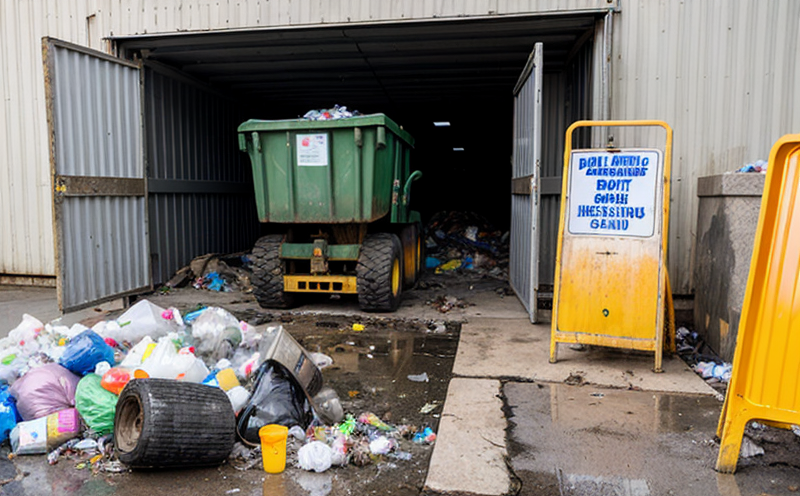Solid waste handling inspection
The process of solid waste handling inspection is critical in ensuring environmental sustainability and compliance with regulatory standards. This service involves a comprehensive examination of various aspects related to the collection, transportation, processing, and disposal stages of solid waste management systems. For quality managers, compliance officers, and R&D engineers within energy systems and environmental surveillance sectors, this inspection ensures that all processes adhere to best practices and international norms.
Solid waste handling encompasses a wide range of materials including municipal solid waste, construction and demolition debris, medical waste, hazardous waste, and industrial waste. Each type requires specific handling methods to ensure safety, minimize environmental impact, and comply with regulations such as ISO 15217-3 or EN 12457. Our laboratory utilizes state-of-the-art equipment to conduct detailed inspections that cover every aspect of solid waste management.
Our team uses advanced analytical techniques to assess the composition, quantity, and quality of waste materials. This includes moisture content analysis, calorific value determination, particle size distribution studies, and chemical composition analyses. The data collected is used to generate detailed reports which serve as a basis for improvement in solid waste management practices.
One key component of our inspections involves the evaluation of waste segregation processes. Proper segregation ensures efficient recycling and minimizes contamination within streams destined for different disposal methods. We employ optical sorting systems and manual inspection procedures to ensure accurate categorization according to international standards like ISO 14001.
The transportation phase is another critical area where our inspections play a vital role. Our team checks vehicles used in waste transport for compliance with safety regulations, proper loading techniques that prevent spillage or leakage, and adherence to routing guidelines designed to reduce environmental impact.
Our laboratory also conducts thorough evaluations of treatment facilities such as landfill sites, composting units, incinerators, and recycling plants. These inspections focus on assessing the effectiveness of treatment processes against specified performance indicators outlined in relevant international standards like EN 12457 for landfills or ISO 9001 for quality management systems.
Another important aspect we cover is monitoring emissions from waste processing operations. Emissions can have significant environmental impacts if not controlled properly; therefore, our laboratory uses sophisticated analytical tools to measure CO2, CH4, NOx levels among others. Compliance with emission limits set by local authorities or international agreements such as the Kyoto Protocol is ensured through these inspections.
Finally, we examine the final disposal methods employed for treated waste materials. This includes checking landfill cells for integrity, verifying compliance of new landfills with design specifications, and assessing old sites for potential risks like leachate pollution or gas migration. By providing detailed reports based on our findings during these inspections, we help clients make informed decisions about their solid waste management practices.
Our approach ensures that every stage of solid waste handling adheres strictly to international best practices while addressing specific local requirements. Through rigorous testing and evaluation, we aim not only at meeting current standards but also predicting future trends in this rapidly evolving field. This proactive stance helps organizations stay ahead of regulatory changes and market demands.
Applied Standards
The solid waste handling inspection service adheres to several key international standards that form the backbone of our methodology:
- ISO 14001: Environmental Management Systems – Ensures organizations implement and maintain effective environmental management systems.
- EN 12457: Landfills for Municipal Solid Waste – Provides guidelines on the design, construction, operation, maintenance, and closure of landfills.
- ASTM D6866-03(2019): Standard Practice for Determining Biodegradability in Synthetic Liquid Media – Used to assess biodegradable properties of waste materials.
- ISO 15217-3: Waste Incineration Plants – Specifies requirements and test methods applicable to incineration plants handling municipal solid waste.
- EN 470-1: Sampling of Solid Fuels for Testing – Covers procedures for sampling solid fuels used in energy production processes.
- IEC 62390-1: Waste Streams from Electrical and Electronic Equipment (WEEE) – Provides criteria for characterizing and managing waste streams generated by electrical and electronic equipment.
These standards provide a robust framework that ensures consistency, reliability, and accuracy in our inspections. They are regularly updated to reflect the latest scientific knowledge and technological advancements, ensuring that we remain at the forefront of solid waste management practices.
Eurolab Advantages
At Eurolab, we pride ourselves on offering unparalleled expertise and cutting-edge technology in solid waste handling inspection services. Our team comprises highly qualified professionals with extensive experience across various sectors including energy systems, environmental surveillance, and more.
- Comprehensive Expertise: Our inspectors are trained to understand the nuances of different types of waste materials and their respective management processes.
- State-of-the-Art Equipment: Leveraging advanced analytical tools allows us to provide precise measurements and detailed analyses, enhancing the reliability of our reports.
- Customized Solutions: We tailor our services to meet the unique needs of each client, ensuring that they receive inspections relevant to their specific operations.
- Compliance Assurance: By adhering strictly to international standards and local regulations, we ensure clients stay compliant with all necessary requirements.
- Rapid Turnaround Times: Our efficient processes enable us to deliver timely reports without compromising on the quality of our inspections.
- Continuous Improvement: We are committed to staying updated with the latest research and developments in solid waste management, allowing us to continuously enhance our service offerings.
With Eurolab's comprehensive approach, clients can expect not just compliance but also proactive insights that drive sustainable practices within their organizations. Our goal is to help them navigate through complex regulatory landscapes confidently while promoting responsible environmental stewardship.





